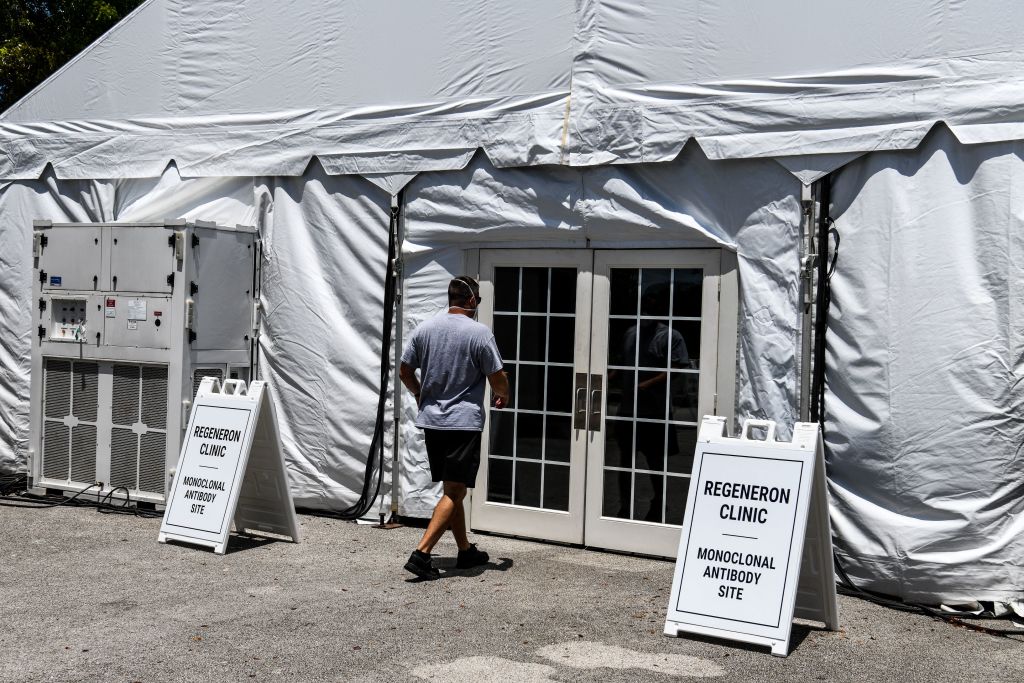Why doctors don't think vaccine skeptics' acceptance of a helpful COVID-19 treatment is sufficient


A free daily email with the biggest news stories of the day – and the best features from TheWeek.com
You are now subscribed
Your newsletter sign-up was successful
Monoclonal antibodies produced by Regeneron and Eli Lilly have become widely accepted as a successful treatment for COVID-19, reducing symptoms quickly and keeping infected people out of the hospital if they act quickly enough. Doctors and vaccine skeptics alike are proponents, but some medical experts argue the antibodies aren't enough on their own to make up for the slow-down in vaccine uptake, The New York Times reports.
The simple explanation is that the more people who get vaccinated, the fewer people there will be who need any sort of coronavirus remedy. Beyond that, the infusions also take a lot of time and require a lot of attention from hospital staff. They're also more expensive, costing the federal government about $2,100 per dose. "It's clogging up resources, it's hard to give, and a vaccine is $20 and could prevent almost all of that," Dr. Christian Ramers, an infectious disease specialist and the chief of population health at Family Health Centers of San Diego, told the Times. Basically, Ramers said, emphasizing monoclonal antibodies and playing down vaccines is akin to "investing in car insurance without investing in brakes."
The other worry is that they can't keep up with the pace of more serious outbreaks. For starters, the treatments only help individual patients, whereas vaccines have a snowball effect, and they also don't provide protective immunity (though the patients would have acquired natural immunity through their infection), the Times notes. Ultimately, while monoclonal antibodies are a vital tool in fighting the coronavirus, "something like that just doesn't scale," Dr. Howard Huang, the medical leader for Houston Methodist's infusion program, told the Times. Read more at The New York Times.
The Week
Escape your echo chamber. Get the facts behind the news, plus analysis from multiple perspectives.

Sign up for The Week's Free Newsletters
From our morning news briefing to a weekly Good News Newsletter, get the best of The Week delivered directly to your inbox.
From our morning news briefing to a weekly Good News Newsletter, get the best of The Week delivered directly to your inbox.
A free daily email with the biggest news stories of the day – and the best features from TheWeek.com
Tim is a staff writer at The Week and has contributed to Bedford and Bowery and The New York Transatlantic. He is a graduate of Occidental College and NYU's journalism school. Tim enjoys writing about baseball, Europe, and extinct megafauna. He lives in New York City.
-
 Are Hollywood ‘showmances’ losing their shine?
Are Hollywood ‘showmances’ losing their shine?In The Spotlight Teasing real-life romance between movie leads is an old Tinseltown publicity trick but modern audiences may have had enough
-
 A dreamy long weekend on the Amalfi Coast
A dreamy long weekend on the Amalfi CoastThe Week Recommends History, pasta, scenic views – this sun-drenched stretch of Italy’s southern coast has it all
-
 Can foster care overhaul stop ‘exodus’ of carers?
Can foster care overhaul stop ‘exodus’ of carers?Today’s Big Question Government announces plans to modernise ‘broken’ system and recruit more carers, but fostering remains unevenly paid and highly stressful
-
 Trump HHS slashes advised child vaccinations
Trump HHS slashes advised child vaccinationsSpeed Read In a widely condemned move, the CDC will now recommend that children get vaccinated against 11 communicable diseases, not 17
-
 A fentanyl vaccine may be on the horizon
A fentanyl vaccine may be on the horizonUnder the radar Taking a serious jab at the opioid epidemic
-
 Health: Will Kennedy dismantle U.S. immunization policy?
Health: Will Kennedy dismantle U.S. immunization policy?Feature ‘America’s vaccine playbook is being rewritten by people who don’t believe in them’
-
 How dangerous is the ‘K’ strain super-flu?
How dangerous is the ‘K’ strain super-flu?The Explainer Surge in cases of new variant H3N2 flu in UK and around the world
-
 Vaccine critic quietly named CDC’s No. 2 official
Vaccine critic quietly named CDC’s No. 2 officialSpeed Read Dr. Ralph Abraham joins another prominent vaccine critic, HHS Secretary Robert F. Kennedy Jr.
-
 This flu season could be worse than usual
This flu season could be worse than usualIn the spotlight A new subvariant is infecting several countries
-
 FDA OKs generic abortion pill, riling the right
FDA OKs generic abortion pill, riling the rightSpeed Read The drug in question is a generic version of mifepristone, used to carry out two-thirds of US abortions
-
 Why are autism rates increasing?
Why are autism rates increasing?The Explainer Medical experts condemn Trump administration’s claim that paracetamol during pregnancy is linked to rising rates of neurodevelopmental disorder in US and UK
